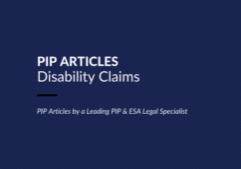What other benefits can I claim with PIP?
Personal independence payment is one of the most useful benefits out there. Getting it does not depend on having paid enough in National Insurance contributions. It is not mean-tested, meaning that you will not be asked how much you are earning or have in other benefit income, and your savings or capital have no relevance either. You can work full-time, part-time or be too unwell to work.
Benefit combinations
One of the few benefit combinations that does not work is PIP and retirement pension, but even this is only a problem with a new claim for PIP, not because having the state retirement pension itself is a problem, but because you could not generally make a new claim for PIP if you are old enough to have the pension. There is no problem with entitlement to PIP continuing past retirement age, so If you have your PIP award, and you continue to meet the conditions for it, you can keep it till any age.
Getting extra in other benefits, just from having PIP
Plenty of people do not realize that you can have a sickness benefit such as employment and support allowance (ESA), and receive PIP as well. This applies to both the contribution-based ESA that you earn with the National Insurance contributions that you have paid, but also applies to the income-related (means-tested) ESA. Not only can you have PIP and ESA at the same time, but just having an award of PIP can increase the amount of income-related ESA you are entitled to. Apart from the basic amount of £73.10 a week (2019/20), having an award of standard rate PIP daily living component will add a ‘severe disability premium’ of £65.85 a week to the calculation of your needs.

Disability benefits such as DLA and PIP are then ignored as income for ESA purposes. If you have enhanced rate daily living component, rather than standard rate, you get an extra £16.80 a week in the form of an ‘enhanced disability premium’. These are not always added automatically as the ESA and PIP systems do not always talk to each other, so you may have to tell ESA about your PIP award. There are exceptions to you getting these premiums, such as someone receiving carers allowance for looking after you, or you having a ‘non-dependent’ living with you, but the detail of these exceptions are outside the scope of this short article, so be sure to take advice.
There are similar premiums to be added to pension credit and income support, so if you have a PIP award, make enquiries about your own circumstances. There are sometimes choices to be made about who gets what within your family or carer set up, and the wrong choice can cost you a lot of money over a year, so do take advice from a competent generalist adviser.
Industrial injuries
It may not be obvious, but someone who has an accident in the course of their work, or who contracts an occupational disease because of the work they do, their work environment or the tools that they use, can claim a ‘no-fault’ benefit called industrial injury disablement benefit, as well as perhaps making a civil claim for damages against their employer, if there was negligence involved. That person can also claim the disability benefit personal independence payment. Perhaps not surprisingly, having satisfied one part of the DWP that you have significant problems, can make it easier to satisfy another part of the Department.
Tax credits
You may be asking where PIP fits in with the ‘disability’ part of working tax credits. For you to get the ‘disabled worker element’ of working tax credits, £3,165 a year (2019/20), personal independence payment would count as a ‘qualifying benefit’. Again, PIP itself is not counted as part of your income for tax credit purposes. People have written chapters in books about the workings of the tax credit scheme, so it is definitely outside the scope of this article.
Carers Allowance
I regularly come across confusion about carer’s allowance and the care component of disability living allowance, and this then extends to the daily living component of PIP. Let us be clear, DLA care is/was paid the person with the care needs, and the same applies to the daily living component of PIP. Carer’s allowance can be paid to the person who provides the care. You can have a situation where someone who receives PIP because of their limitations also qualifies for carer’s allowance. There does not need to be a clash here, but the Department can be expected to be sceptical. If for example, you provide supervision, guidance or encouragement, that can be done in spite of physical restrictions you may have. For there to be a possible carer’s allowance claim, the person with the care needs must be on a ‘qualifying benefit’. Either rate of the daily living component will do, but neither rate of the mobility component will help here.
I think that it was US General H Norman Schwarzkopf Jr. who talked about the things that we know, the things that we don’t know, and the things that we don’t know that we don’t know. If this article serves to alert you to things that you did not know that you did not know, but can make further enquires about, then it will have served a useful purpose.


 What illness qualifies for PIP?
What illness qualifies for PIP?